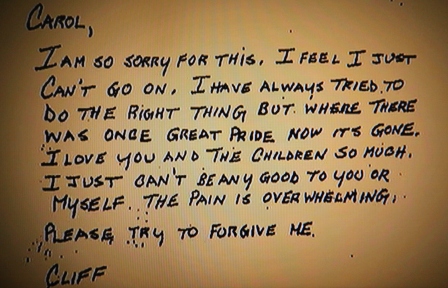Tuesday, May 11, 2010
PHOTOS |
COMING SOON|
EXAMINER.COM FILM ARTICLES
||HOME
INTERVIEW
Alex Gibney's Grand Gamble
Of Graft and Greed

Alex Gibney, director of the new documentary, "Casino Jack: The United States Of
Money".
Timothy Greenfield-Sanders
by
Omar P.L. Moore/PopcornReel.com
 FOLLOW
FOLLOW
Tuesday, May 11, 2010
Are there filmmakers out there now who are forensic-like dissectors of human
behavior and more clinical than Alex Gibney?
You may have to look long and think hard to come up with another contemporary
documentary filmmaker who plunges the depths of human malice more deeply than
Mr. Gibney, whose new documentary "Casino Jack
And The
United States Of Money" opened in New York and Los Angeles over the weekend
and arrives in San Francisco and elsewhere this Friday.
Mr. Gibney has a keen eye for chronicling the destructive, reckless forces of
the powerful and their hubris, whether being part of the team behind the epic
documentary "The Corporation" (2004) or the sole architect of the chilling
"Enron: The Smartest Guys In The Room" (2005), still his most penetrating work.
He has also looked at one of the most vital and significant figures in American
literary and political culture, the late Hunter S. Thompson, in
"Gonzo" (2008).
The filmmaker has also been introspective, with figures like his late father in
the moving and powerful "Taxi To The Dark Side"
(2007), for which he won the Best Documentary Feature Academy Award in 2008.
Mr. Gibney also executive-produced Charles Ferguson's documentary
"No End In Sight" (2007).
In addition to "Casino Jack", Alex Gibney is busy with two other documentaries,
which just happened to both come together this year: "Freakonomics", a segment
of which he directed, and "Eliot Spitzer", about Mr. Spitzer's rise and fall
both personally and politically. Both were shown recently in world
premieres at the just-concluded Tribeca Film Festival in New York City.
The order of this particular day though is "Casino Jack", and Mr. Gibney was on
the phone from Washington D.C. late last month to talk about the film, which
focuses on the criminal activity of Jack Abramoff, currently serving a four-year
prison sentence for his political bribery, corruption and ethics crimes.
A studious man, Mr. Gibney said he was grateful for the acknowledgment of the
role of music has played in his documentaries, especially this new one.
"Picking the music is one of the great joys for me," Mr. Gibney said. "The
music in my films work in two ways: as a typical Greek chorus and as an emblem
of character. The songs represent character. Howling Wolf becomes a
poet laureate to Jack Abramoff. In (the scenes of) Angola prison, there's
"Enter Sandman" from Metallica."

Convicted felon Jack Abramoff, now behind bars.
Corbis
Mr. Gibney has used a lot of blues, R&B and rock music to amplify the themes in
his films, which are often told in chapters, insightful and entertaining
episodes of irony, doom, decline and chaos of the personalities and events he
documents.
Some of the music when juxtaposed against the amoral and venal behavior of the
soulless creatures of Mr. Gibney's films operates as a slice of comic relief.
(Over the closing credits of "Enron" for example, Tom Waits growls like a hungry
bear on his song poetically titled "God's Away On Business".) However one
views the music punctuating "Casino Jack", there's no doubt about what the
director feels about music.
"Music is a passion for me."
And obviously music isn't the director's only interest.
"I've always been interested in corruption. You know, the idea, the saying
that absolute power corrupts absolutely. People who get drunk on power get
very reckless. And once you start to believe your own press, the sky's the
limit."
"Casino Jack" features punch-drunk corruption, wall-to-wall sloth, and
chronicles an audaciousness some may even find sexy. A breezy,
devil-may-care recklessness and abandon by corporate monsters might titillate or
attract some with addictive personalities or lizard-brained, hard-wired limbic
systems. Mr. Abramoff, a convicted felon and former lobbyist, gleefully
behaved in a "kiss my ass" and "go f--k yourselves" way that viewers who haven't
paid attention to the news will see in Mr. Gibney's film as cold, creepy and
disturbing. There's also a high level of fascination attendant with the
roulette wheel of corruption spinning through the corridors of power in
Washington D.C.
Make no mistake, Mr. Abramoff's conduct, just like that of Ken Lay, Jeffrey
Skilling and Andrew Fastow of Enron constituted economic terrorism, although on
a smaller, yet severe scale. Mr. Gibney however, spills the tragic,
electrifying story of Darwinian monsters bent on destruction without judgment,
unlike such documentary filmmakers as Michael Moore, whose approach is more
colorful and indicting. By contrast, in "Casino Jack", as in all of his
films, Mr. Gibney lays out the sordid tale and lets the crooks on Capitol Hill
and elsewhere speak loudly for themselves.
"Casino Jack" has an assorted cast of characters including former Ohio
Republican congressman Tom DeLay, an indicted felon who Mr. Gibney pointed out
will be facing state charges on corruption and bribery, due to a Texas court's
recent decision not to throw out the state charges Mr. Delay sought the removal
of.

A screen shot of Enron executive Cliff Baxter's suicide note to his wife, as
seen in Mr. Gibney's 2005 documentary "Enron: The Smartest Guys In The Room".
Magnolia
Pictures
The film took three years to make, and surprisingly it wasn't too difficult
getting the principals involved to go on camera for "Casino Jack", including Bob
Ney, the former Ohio Republican congressman who served a two-year prison
sentence for his criminal involvement with Mr. Abramoff.
As is the case in numerous Alex Gibney documentaries, there are gray area-type
figures and sympathetic beings, and in "Casino Jack", which debuted at Sundance
in January, there's Neil Volz, the former chief of staff for Mr. Ney.
"Neil Volz was torn between doing the right thing and left a deeply corrupted
figure," Mr. Gibney commented. Mr. Volz, a young, idealistic man, was
convicted of conspiracy and bribery in connection with Mr. Ney and Mr. Abramoff.
"Casino Jack" reveals Mr. Volz's considerable role in the malfeasance permeating
Capitol Hill.
The director gave his own reflections of Mr. Volz.
"He was able to speak very honestly but also very personally about the process
of corruption. He typified the curiosity that is human, that many of us
have, with temptation. We all get tempted to step over the line just a
little bit. You keep going a bit further and further. Pretty soon
you forget where the line was."
With the explosion of American political and corporate scandals in this early
21st century, will Mr. Gibney weigh in on the 2008 Goldman Sachs nightmare in a
future documentary?
"You know, I sometimes think that I get a bit too deep into the finance realm
(when it comes to corruption), but the fact is that there's an abuse of high
finance and fiduciary principles at the heart of corruption in this era.
You can't help but look at it."
"Casino Jack: The United States Of Money" is now playing in New York and Los
Angeles and will soon be playing across the U.S. The documentary is
released by Magnolia Pictures.
SUBSCRIBE TO THE POPCORN REEL MOVIE
REVIEWS RSS FEED

PHOTOS |
COMING SOON|
EXAMINER.COM FILM ARTICLES
||HOME